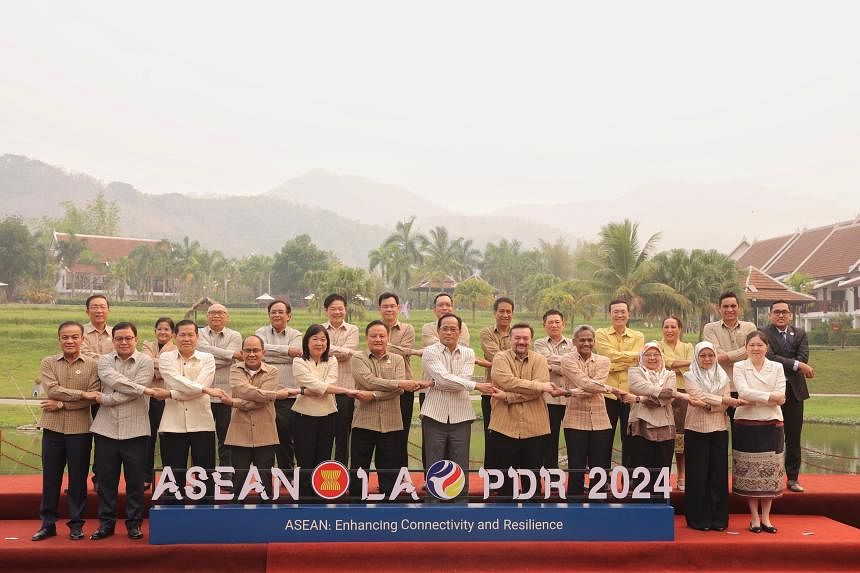SINGAPORE – A rebound in exports and tourism is likely to aid most South-east Asian economies in performing better in 2024 than the year before, said top finance officials of the region at a meeting in Laos.
However, the outlook is clouded by “adverse financial spillovers from geopolitical tensions, volatility in global commodity prices, and weaker economic growth in China”, noted the joint statement issued at the conclusion of the 11th Asean Finance Ministers’ and Central Bank Governors’ Meeting on April 5.
Deputy Prime Minister and Minister for Finance Lawrence Wong attended the two-day gathering aimed at enhancing the bloc’s monetary and financial cooperation, forging an inclusive and sustainable future, and embracing the digital economy.
DPM Wong concluded a series of meetings with ministers and officials from around the region, in which they discussed how Asean countries can work together to enable sustainable and inclusive growth – from enhancing connectivity and payment linkages to accelerating financing for green transitions.
“One thing is clear – no Asean country can go it alone to achieve our common goals. It is only by working together that we can realise Asean’s full potential,” he said in a social media post from the city of Luang Prabang – once the royal and religious hub of Laos – where the meeting was held.
“With our collective efforts, Asean will remain a bright spot in the global economy, and bring benefits for all our peoples,” he added.
The Asean joint statement noted that the region’s economic performance is underpinned by strong domestic demand and increased investment activity amid moderating inflation.
However, structural issues – including climate change, rapid digitalisation and an ageing population – will continue to shape economic development across Asean.
“Stronger regional economies, through strengthening integration and connectivity in Asean, are essential to navigate the challenging global environment,” the statement said.
The Asean ministers and central bankers also exchanged views with officials of the Asean+3 Macroeconomic Research Office (Amro), the Asian Development Bank, the World Bank and the International Monetary Fund on the global and regional economic outlook, risks and challenges to the region.
Amro, in its January outlook report, expected the region to grow by 4.9 per cent, up from 4.3 per cent in 2023.
Among other key issues, the finance ministers and central bankers discussed the bloc’s initiatives to boost financial integration and cooperation.
They also welcomed in the joint statement progress in the adoption and expansion of cross-border QR payment services among Asean member states.
The statement noted that the recent launching of Cambodia-Laos, Cambodia-Vietnam, Singapore-Indonesia, Singapore-Malaysia and Laos-Thailand linkages has placed Asean at the forefront of QR payment services integration globally.
The Working Committee on Payment and Settlement Systems was asked to continue identifying challenges in the adoption and usage of cross-border QR payments, draw up plans to promote adoption, and push for collaboration between central banks and banking industry associations to further drive usage.
The launch of the cross-border person-to-person fund transfer linkage between Singapore and Malaysia, which enables instant fund transfers via proxies like mobile phone numbers, was also welcomed.
Amid discussions on climate change, the meeting deliberated on the Asean Infrastructure Fund’s initiative to lead green finance, and the fund’s next steps towards optimising existing capital and mobilising more resources for sustainable infrastructure.
The meeting noted the progress of the Working Committee on Capital Market Development and its Infrastructure Finance Working Group on sustainability bonds to finance sustainable infrastructure projects in the region.
The meeting also discussed voluntary carbon markets that can help in a just, credible and orderly transition to a green future.
Asean’s relations with external partners also came under discussion. Implementation of the strategic directions and priorities plans under the Asean-Australia-New Zealand Free Trade Area and progress made in the Asean-Canada Free Trade Agreement negotiations were also discussed.
The joint statement acknowledged the upskilling-related initiatives pursued by Asean’s Working Committee on Financial Services Liberalisation, through the Asean-UK Financial Services Cooperation effort.


